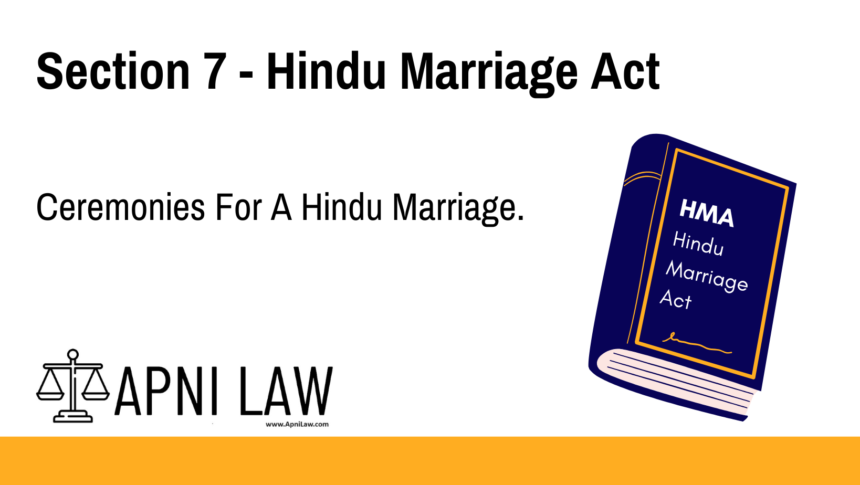Code: Section 7 – Hindu Marriage Act
“Ceremonies for a Hindu marriage.—
(1) A Hindu marriage may be solemnized in accordance with the customary rites and ceremonies of either party thereto.
(2) Where such rites and ceremonies include the Saptapadi (that is, the taking of seven steps by the bridegroom and the bride jointly before the sacred fire), the marriage becomes complete and binding when the seventh step is taken.”
Explanation of Section 7 – Hindu Marriage Act
Section 7 of the Hindu Marriage Act, 1955, deals with the ceremonial aspect of Hindu marriages. It states that a Hindu marriage is valid when performed according to the customary rites and rituals of either the bride’s or groom’s community.
One of the most important ceremonies recognized under this section is the Saptapadi. If the chosen customary ritual includes the Saptapadi—taking seven steps before the sacred fire—the marriage is considered complete and legally binding upon the seventh step.
Key Highlights:
- The marriage ceremony must be performed in accordance with customary rites.
- Either party’s traditions are acceptable.
- If Saptapadi is a part of the custom, the marriage is valid only upon completion of the seventh step.
Illustrations
Example 1: Marriage with Saptapadi
A Hindu couple from Uttar Pradesh follows the traditional custom of Saptapadi during their marriage. Once the bride and groom take the seventh step around the sacred fire, their marriage becomes complete and binding as per Section 7.
Example 2: Marriage without Saptapadi
A Tamil Hindu couple performs their marriage by following the customs of tying the mangalsutra and offering prayers, without Saptapadi. Since these rites are customary in their community, the marriage is valid under Section 7.
Common Questions and Answers
1. Is Saptapadi mandatory for all Hindu marriages?
No, Saptapadi is only necessary if it is part of the community’s customary rites. Other traditional ceremonies may also be valid if they are recognized customs of the concerned parties.
2. Can a Hindu marriage be invalid without rituals?
Yes, if the marriage is not performed with any recognized customary rites, it may not be valid under the Hindu Marriage Act.
3. What if the seventh step is not completed?
If Saptapadi is required by the community and the seventh step is not completed, the marriage may not be considered valid or complete under Section 7(2).
4. Is a court marriage different from a Hindu marriage under this Act?
Yes. Court marriages fall under the Special Marriage Act, 1954. However, if a Hindu marriage is solemnized with customary rites and later registered, it is valid under the Hindu Marriage Act.
Conclusion
Section 7 of the Hindu Marriage Act, 1955, upholds the importance of religious and cultural ceremonies in solemnizing Hindu marriages. It emphasizes that a marriage becomes legally binding only when the accepted rituals—such as Saptapadi—are duly performed. Understanding these provisions is crucial for ensuring the legal validity of a Hindu marriage.
For more detailed legal guidance on Hindu marriage laws, visit ApniLaw today.











